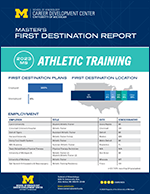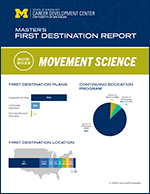
What Can I Do With My Degree?
A lot! Our degree programs prepare students for success after they graduate. You can find first destination plans and sample careers below for each program.
Read more about our students' post-graduation plans and our alums' careers on our SoK Spotlight page and in our Cool Jobs series.
Applied Exercise Science
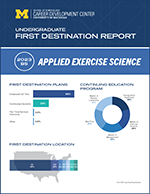
After completing the Applied Exercise Science program, historically approximately 70% of graduates work and 30% continue their education. Graduates working directly after graduation gain employment in health, wellness, and clinical settings in positions such as biometric specialists, assistant studio managers, medical assistants, front desk administrators, and physical therapy technicians. Students who are interested in continuing their education after graduating matriculate into public health, nursing, movement science, or business master's programs. Prior to 2019, this program was named Health and Fitness.
First Destination Reports
Professional Associations
Athletic Training
University of Michigan Athletic Training master's graduates have gone on to full time positions within professional, college, and high school athletics settings. Additionally, our graduates have pursued careers into many emerging settings, such as the performing arts, rehabilitation clinics, and residencies in orthopedic physician settings. Some of our graduates have pursued further education by enrolling in clinical doctoral programs in Athletic Training or academic doctoral programs in sport medicine.
First Destination Reports
Professional Associations
Movement Science
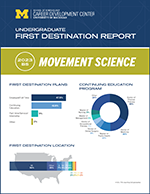
Students graduating with a BS in Movement Science further their careers by continuing education directly after graduating or working in a wide variety of health professions. Historically, between 30-40% continue their education after graduating and 60-70% work in clinical healthcare, research, or health business positions. Many of those employed after graduation take one or more gap years before continuing their education.
Master's of Movement Science graduates pursue careers in biomechanics, sport performance, academia, and more. Many advance their education further in kinesiology, movement science, exercise science, or neuroscience doctoral programs. PhD in Movement Science graduates primarily seek faculty positions in higher education.
First Destination Reports
Learn more about what U-M MVS alumni are doing after they graduate:
Professional Associations
Sport Management
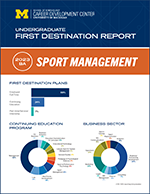
Upon graduating with a BA in Sport Management, the majority of students pursue sport and sport-adjacent careers in business-related fields such as marketing, operations, business/partnership development, data and analytics, HR/management, talent representation and finance. A relatively small percentage enroll in continuing education programs primarily in the fields of business administration, management, and law. Historically, between 80-90% of graduating BA students will secure either full-time or part-time (including internships) employment while 10-20% will choose to continue their education and training.
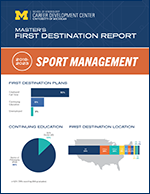
Master's of Science in Sport Management students tend to pursue careers in business/partnership development, education and operations. A relatively small percentage, historically between 5-10%, enroll in continuing education programs primarily in the fields of business analytics, management & organizations, and law. PhD in Sport Management students primarily seek opportunities in education and collegiate athletics.
First Destination Reports
Learn more about what U-M SM alumni are doing after they graduate:
